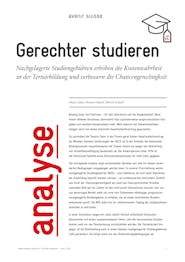Education has many positive benefits ‒ for the individual and for society as a whole. After a higher degree, graduates typically work in jobs requiring qualifications that pay correspondingly more. Because this increases tax revenues, an implicit social contract is said to exist.
That’s the theory. In practice, this social contract is beginning to falter. According to OECD estimates, the fiscal return on education in Switzerland is comparatively low. Not only that, but because of the trend to part-time employment, the return is tending to decline. When people work less than 70 percent FTE, often there is no longer any fiscal return on a university degree.
The new analysis by Marco Salvi, Florence Mauli, and Patrick Schnell shows various options for dealing with these changing circumstances. According to the authors, deferred tuition fees ‒ in other words fees that only have to be paid after someone has completed their education ‒ should be looked into. Deferred tuition fees score well on both the equal opportunity and financial policy fronts. They’ve also been tried and tested in different parts of the world. The Avenir Suisse model envisages levying a progressive deferred tuition fee dependent on income, from a certain minimum income. The deferred tuition fee would have to be paid until the accumulated debt had been fully repaid.
In a simulation of their model for deferred tuition fees, the authors show that even graduates working full time for comparatively low pay would be able to repay the tuition costs they incurred before retirement. The rate at which they did so would largely depend on the repayment terms.







